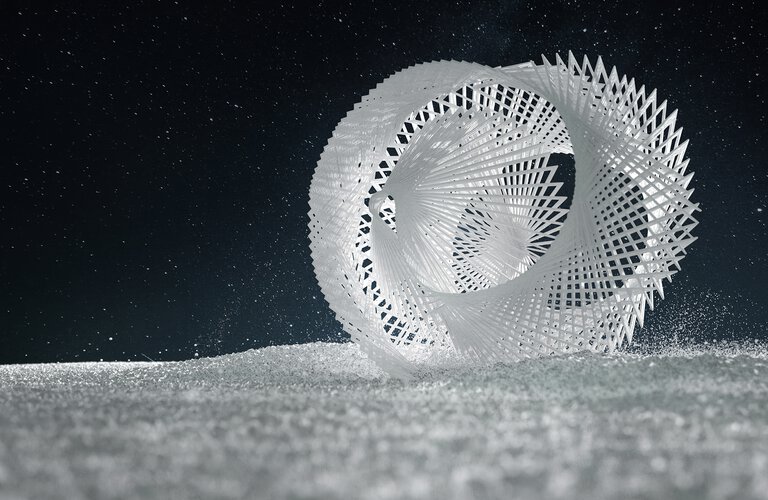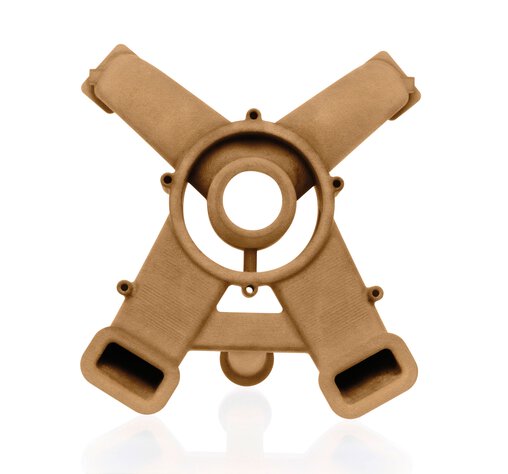PEKK for Additive Manufacturing Properties Similar to ULTEM™ Filament*
Materials in this family of polymers are chemical compounds with ether and ketone groups. Compared to other plastics, they have very high glass transition and melting temperatures, which is why they are used in high-temperature applications. PAEK materials are semi-crystalline aromatic polyetherketones with excellent mechanical properties even at high temperatures. They permit continuous operating temperatures of up to 260°C. They are flame retardant and have high chemical resistance, hydrolysis resistance, high stiffness and strength, as well as very good tribological properties.
Fields of application:
Thanks to their long service life, PAEK polymers are often used to make high-performance molded parts in industrial contexts, e.g. bearing cages, gearwheels and impellers in pumps and high-pressure systems, especially ones that come into contact with aggressive media. The medical field uses them as a biocompatible material to manufacture sterilizable medical devices or patient-specific implants. They are more cost-efficient than metal implants, and they also avoid some of the associated side-effects, such as sensitivity to the weather. The aerospace industry uses this inherently flame-retardant material as a substitute for metal in the interior and air conditioning systems.
HT-23 Polyetherketoneketone Reinforced With Carbon Fibers
This medium-gray high-performance plastic from the group of polyetherketoneketones (PEKK) consists of 23% carbon fibers encapsulated (compounded) in the round powder grains of the material. By comparison with 3D-printed components, which have dry mixed carbon fibers, the properties of parts made from HT-23 are almost isotropic. They are also chemically resistant, with a high melting point, and their inherent flame-retardant properties are similar to ULTEM™ filament*. The material is approved for parts destined for the interior of trains under DIN EN 45545-2:2016, Requirement Sets R1 and R24.
Typical mechanical properties
| Tensile modulus | 6500 MPa |
| Tensile strength | 71 Mpa |
| Elongation at break | 1.16% XY |
Thermal properties
| Melting temperature (20°C/min) | 302°C |
| Heat deflection temperature (1.80 MPa) | 212°C |
Physical properties
| Density | 1390 kg/m³ |
Complies with standards: FAR 25.853, DIN EN 45545
* ULTEM™ is a registered trademark of SABIC or its affiliates or subsidiaries.PEKK 100 Unfilled Polyetherketoneketone, beige
The high-performance polymer is based on an unfilled PEKK and shows higher elongation at break and impact strength while maintaining high tensile strength compared to the carbon fiber-filled material HT-23.
At high operating temperatures in the range of 80-180°C, the material demonstrates its unique capabilities and shows a massive increase in toughness while maintaining high strength and stiffness. PEKK exhibits similar properties to injection-molded 35% glass-fiber-filled polyamide 6, making it an ideal substitute for small-series applications, especially in the automotive industry.
Its excellent chemical and oil resistance, even at elevated operating temperatures, makes PEKK particularly suitable for the manufacture of industrial and automotive parts.
Furthermore, it is characterized by excellent insulation properties (high dielectric strength) and, in combination with its halogen-free flame retardancy (UL94-V0), is suitable for use in electronic & electrical (E&E) applications. Due to its inherent flame retardancy, PEKK is also a much-asked material for metal replacement in aerospace and mobility (rail) applications. Its excellent abrasion resistance and sliding friction properties are of interest for many industrial applications.
Typical mechanical properties
| Tensile modulus | 4000 MPa |
| Tensile strength | 81 Mpa |
| Elongation at break | 2.3% XY |
Thermal properties
| Heat deflection temperature (0.45 MPa) | 249°C |
| Heat deflection temperature (1.80 MPa) | 165°C |
Physical properties
| Density | 1290 kg/m³ |
Complies with standards: UL94 V-0 with 1.6 mm



